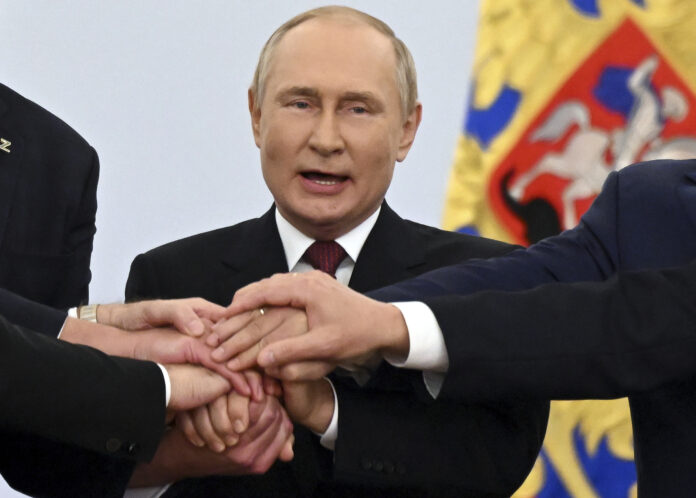Russian President Vladimir Putin ordered his government on Wednesday to take control of Ukraine’s Zaporizhzhia nuclear power plant, Europe’s largest, as the UN nuclear watchdog warned that power supply to the site was “extremely fragile.”
However, the boss of Ukraine’s state energy agency announced he was taking over the plant, which has become a focus of international concern due to the possibility of a nuclear disaster after shelling in the area for which Moscow and Kyiv have blamed each other.
Russia captured the Zaporizhzhia nuclear power plant (ZNPP) in March shortly after invading Ukraine, but Ukrainian staff have continued to operate it.
The plant is located in the southern Ukrainian region also called Zaporizhzhia, one of four regions that President Vladimir Putin formally incorporated into Russia on Wednesday in a move condemned by Kyiv as an illegal land grab.
“The Zaporizhzhia nuclear plant is now on the territory of the Russian Federation and, accordingly, should be operated under the supervision of our relevant agencies,” RIA news agency quoted Deputy Foreign Minister Sergei Vershinin as saying.
Putin later signed a decree that designated the ZNPP “federal property.”
Russia-Ukraine conflict: UN inspectors remain at Zaporizhzhia Nuclear power plant – Sep 2, 2022
Russia’s nuclear power operator Rosenergoatom said it would conduct an assessment of how to repair damage to the plant’s infrastructure and would transfer all the existing Ukrainian employees to a new Russian-owned organization.
“The new operating organization is designed to ensure the safe operation of the nuclear power plant and the professional activities of the existing plant personnel,” it said in a statement.
Trending Stories
A suspected serial killer is hunting in California. Here’s what we know so far
Air Canada passenger’s bag arrives destroyed. A nightmare followed
Meanwhile, the head of Ukraine’s state nuclear energy company said he was taking charge of the ZNPP and he urged workers there not to sign any documents with its Russian occupiers.
“All further decisions regarding the operation of the station will be made directly at the central office of Energoatom,” Petro Kotin said in a video address posted on the Telegram messaging app.
“We will continue to work under Ukrainian law, within the Ukrainian energy system, within Energoatom,” Kotin said.
His comments followed the brief detention by Russian forces last weekend of the ZNPP’s Ukrainian director Ihor Murashev. The International Atomic Energy Agency (IAEA) later said that Murashev had been released but would not return to his old job.
IAEA chief Rafael Grossi is currently in Ukraine for further consultations on “agreeing and implementing a nuclear safety and security protection zone around the ZNPP as soon as possible,” the U.N. agency said.
On Wednesday Grossi reiterated his concerns about the power supply to the plant.
“The situation with regards to external power continues to be extremely precarious. We do have at the moment external power but it is, I would say fragile. There is one line feeding the plant,” he told the Energy Intelligence Forum in London via telephone link.
‘Half of the house was gone’: Missile destroys refugees’ home in Ukrainian village – Sep 19, 2022
Grossi is also due to visit Moscow this week, and Russia’s state-owned TASS news agency said he might also visit the ZNPP after traveling there last month with a team to inspect damage caused by shelling in the vicinity.
Before Russia’s invasion, the plant produced about one-fifth of Ukraine’s electricity and nearly half the energy generated by the country’s nuclear power facilities.
Russia acted to annex Zaporizhzhia and three other regions after holding what it called referendums – votes denounced by Kyiv and Western governments as illegal and coercive. Moscow does not fully control any of the four regions.
© 2022 Reuters



